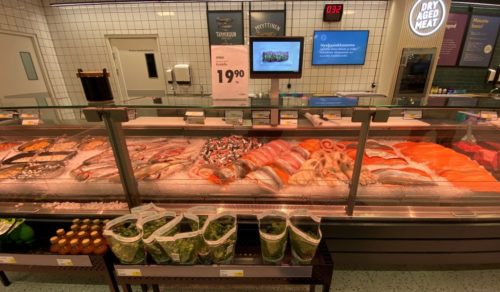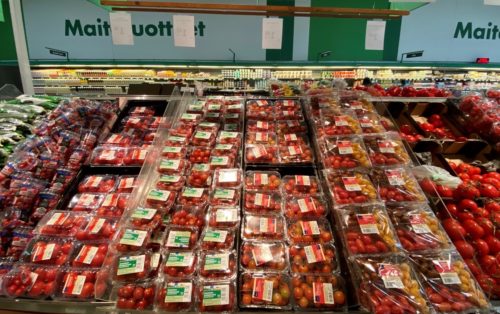Anna Chrysafi has a deep interest in food and a research background in aquatic sciences. She joined the water and development group, as she wanted to challenge herself and learn more about sustainability issues and other natural resources. In this post, she shares her thoughts and struggles when she is buying food, while trying to make sustainable choices.
I grew up in a country with a strong food culture, visiting the fish market with my dad was one of my childhood highlights. This naturally brought me to the carrier path I chose for me. I got a bachelor’s degree in biology and then my interest on aquatic resources drove me to the world of fisheries science. I spent many years studying about the seafood we eat, basic biology, population dynamics, exploitation issues, management and policy regulations. Therefore, I got confident that when I go to the market to buy some fish for the dinner table I can make informed sustainable choices. But do I? Does what I think is the right choice, based on what I learned all these years, actually is? Well the answer is both yes and no. It depends on what are the borders of the system one considers and what impacts one considers. Joining the Water & Development research group, has opened my horizons to start thinking of other aspects of sustainability that before where out of the scope of my research. This gives me a new more holistic perspective and second-guessing my choices when I go grocery shopping.
I will explain here what I mean. I am a big supporter of MSC (Marince Stewarship Council) certified seafood because a) it guarantees that the product I buy is harvested sustainably, while considering the impacts on the ecosystem and b) because traceability is very high, mislabeling of MSC-certified products is less than 1%, while the global average is 30%. Yes you read this correct! Mislabeling is a huge issue jeopardizing fisheries sustainability and for me, this is a good enough reason to support ecolabelled seafood. So I go to the store, I buy my MSC-certified fish and I am happy and sure for my choice. Correct? Wrong! It was only last year that I came across research that has estimated the environmental foortprints of seafood. To my surprise, due to my earlier ignorance, looking for example the GHGs emissions of wild fisheries captures, I came to the realization that potentially many of MSC certified products have as high carbon footprint as livestock production, so obviously then my choice is not good from a climate point of view. Then how do I buy a product that is sustainable from both perspectives? For me this issue can be solved as I can look into literature and scientific reports, to find out which MSC certified seafood products come from which type of fisheries, but I will probably have spent many days on it. The question is though, do people need to get a PhD in fisheries to be able to buy their seafood, while trying to consider what is best for the earth? Well the answer obviously is no they do not. Hopefully in the future seafood guidelines will be improved to cover more aspects of sustainability (integrating research on fish stock health, environmental impacts and nutritional value) that will help people (including me) to make better choices.

Let’s move to all the other products we buy from the grocery stores. There my anxiety when I go shopping is higher, as I basically know very little about production methods, resources needed to produce each food item and how to make an informed, good for the earth, purchase. I know the general rule that eating less meat is good for both my health and the environment but just this, is not enough for me. When I am at the grocery store I always start to think should I buy Spanish peppers or Finnish peppers? Should I buy oranges from South Africa or Spain? Is local always better than imported? Is organic indeed more sustainable? If yes, from what perspectives? Sometimes I wonder if I am making my life too hard by overthinking it. Then I talk with others about it and I see that they are also thinking it, so it is not just me that is concerned about what I buy. I even wish sometimes that a life-cycle assessment or environmental footprints accompanied each product in the label to make the struggle of what to choose easier, but this is probably too complicated. I am confident that there are out there many people that would like to buy more sustainable food but are unable because of lack of knowledge.
There is a lot of research focusing on healthy and sustainable diets and recently FAO and WHO compiled a report with guiding principles for sustainable healthy diets after requests from various countries, so seems that we are moving to the right direction. But here is my concluding point of this post. It is a fact that in the future world we have to feed 9 billion people. It is also a fact that we need to reform our eating habits to achieve this. It is also a fact that it is extremely difficult to make people change their habits (for many reasons out of the scope of this post), so I get it these things take time. But for us, the everyday consumer, that wants and have the means to change (living in a privileged part of the world helps a lot) but have no clue how to make sustainable food choices, please make such information available now, in a simple and cohesive way, so next time we go to the grocery store, shopping is less scary.

Anna Chrysafi works as a postdoctoral researcher in SOS.Aquaterra project.

